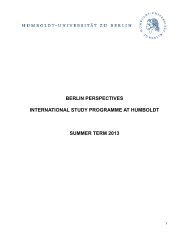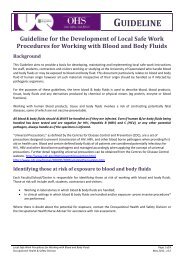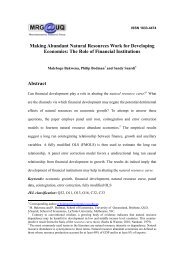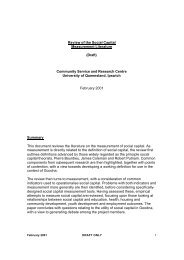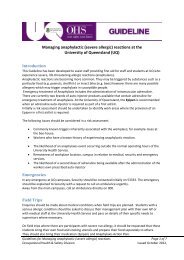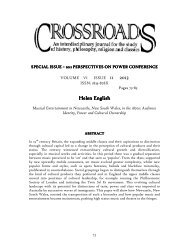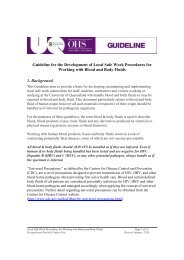Thinking, Willing and Judging - University of Queensland
Thinking, Willing and Judging - University of Queensland
Thinking, Willing and Judging - University of Queensland
Create successful ePaper yourself
Turn your PDF publications into a flip-book with our unique Google optimized e-Paper software.
are doing, without in some cases even being particularly aware that you are doing it. For example, you arerunning through the forest <strong>and</strong>, after a while, you forget that you are even running. You aren’t aware <strong>of</strong> liftingyour feet, dodging the rocks, sucking in air, <strong>and</strong> so on. You might even begin to think about what you will havefor dinner while you are running, or start to think thoughtfully about a deep philosophical problem. Thus whileyou are undertaking one activity thoughtlessly, in this case running, you might be undertaking another activity,in this case thinking, thoughtfully. But it is hard to do more than one thing at a time thoughtfully.To see why, consider the example <strong>of</strong> a person who needs to walk through a crowd. He can walk through thecrowd thoughtlessly, bumping into others as he walks forward without really caring or even noticing, obliviousto where he is in relation to others, his mind focused elsewhere. Or he can walk through the crowd thoughtfully,trying to avoid bumping into others, aware <strong>of</strong> where he is <strong>and</strong> where others are <strong>and</strong> the way his bag swingsbehind him, ready to <strong>of</strong>fer an apology (which is genuine, not words uttered as a sort <strong>of</strong> reflex) whenever heinadvertently bumps into anyone. Being acutely aware <strong>of</strong> his surroundings, he stops spontaneously to help thewoman who drops her bag in front <strong>of</strong> him in the middle <strong>of</strong> the crowd (the thoughtless person barely even noticesthis). ‘How thoughtful,’ she exclaims as he h<strong>and</strong>s back her bag. But it is very hard to think thoughtfully whilealso walking through a crowd thoughtfully. If you are busy thinking deeply <strong>and</strong> thoughtfully about somedifficult metaphysical problem, then your mind is elsewhere. You are absentminded. Your mind is therefore toopreoccupied with its own thoughts to notice those around you. In this case to undertake one activity, that <strong>of</strong>thinking, thoughtfully, is to thereby undertake another activity, that <strong>of</strong> walking through the crowd, thoughtlessly,<strong>and</strong> vice versa.A thoughtful person is someone who judges well what needs to be thought about <strong>and</strong> when it needs to bethought about, as well as what needs to be undertaken thoughtfully, <strong>and</strong> what does not, <strong>and</strong> when it does <strong>and</strong>does not. This illustrates the double-edged nature <strong>of</strong> thinking. Both too much <strong>and</strong> too little thinking, or thinkingundertaken without judgment (at the wrong time, for example), has its dangers. xxx Too much thinking can makeus withdrawn <strong>and</strong> distant from the world so that we lose touch with it <strong>and</strong> become likely to bump into things <strong>and</strong>people, whereas too little thinking can fail to alert us to the moral significance <strong>of</strong> our actions. There is alsotension between thinking <strong>and</strong> thoughtfulness since being thoughtful about what we are doing, such as walkingthrough a crowd, can get in the way <strong>of</strong> thinking, <strong>and</strong> thinking can in turn get in the way <strong>of</strong> being thoughtfulabout other things. A thoughtful person judges well what to be thoughtful about <strong>and</strong> when to undertake aparticular activity, be it thinking or acting, thoughtfully.But while a thoughtful person (among other things) necessarily thinks, a person who thinks is not necessarily athoughtful person. A thoughtless person, someone who fails to think about what she is doing <strong>and</strong> the effects thiswill have on others, may still engage in the activity <strong>of</strong> thinking. Thus one can think without being thoughtful,that is, one can think in a way that is not thoughtful. Such thinking skims along the surface. It fails to unearth thesignificance <strong>of</strong> what one is thinking. But it is still thinking, even if it is not thoughtful thinking. In this sensethinking is an everyday activity, something we all do all the time, even though few <strong>of</strong> us are ideally thoughtfulpeople.We can (<strong>and</strong> do) think about all sorts <strong>of</strong> things <strong>and</strong> people, real <strong>and</strong> unreal, possible <strong>and</strong> impossible, aboutevents from the past or events that might happen or can never happen, about theories, concepts, words, stories,films, desires, dreams, <strong>and</strong> so on. This <strong>of</strong>ten takes the form <strong>of</strong> what we shall call ‘everyday thinking.’ xxxiEveryday thinking is a near relative <strong>of</strong> remembering <strong>and</strong> imagining. Indeed, as Deutscher notes, ‘to remember isto begin to think.’ xxxii To think in this sense is to withdraw from the world for a time to dwell uponsomething. xxxiii To dwell upon something is to concentrate <strong>and</strong> focus on it, to explicitly direct attention toward it,<strong>and</strong> not merely to daydream about it in an unfocused manner. In this sense we can think about something,especially when we stick to the surface <strong>of</strong> things, even if our frame <strong>of</strong> mind is not characterised bythoughtfulness. We can think without accompanying second order thoughtfulness about what we are thinking<strong>and</strong> why we are thinking it.In this sense it is undeniable that Eichmann sometimes, perhaps <strong>of</strong>ten, engaged in the activity <strong>of</strong> (at least‘everyday’) thinking. Eichmann sometimes, surely, thought about what he would do on the weekend, what hewould have for dinner, the day he was married or joined the S.S., his favourite book, how he could efficientlytransport Jews to death camps, <strong>and</strong> so on. Sometimes, no doubt, he dwelt in thought upon such issues, <strong>and</strong> hemay have even done so thoughtfully. What disturbs us is not that Eichmann did not think, but that he was notthoughtful about something <strong>of</strong> such immense moral importance as genocide. His thoughts about what he wasdoing stayed on the surface <strong>of</strong> things; how to organise this, who to contact to get that done, who to assign thispiece <strong>of</strong> work to, who to impress in order to gain promotion, <strong>and</strong> so on. He failed to be thoughtful about what he56


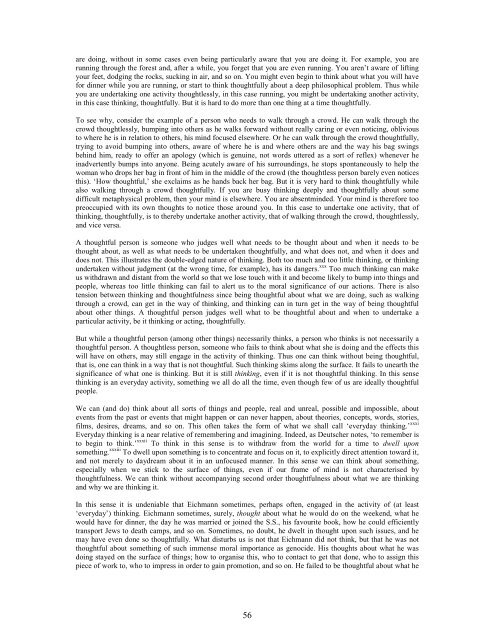

![Recycling [ PDF, 62KB ] - University of Queensland](https://img.yumpu.com/51805185/1/184x260/recycling-pdf-62kb-university-of-queensland.jpg?quality=85)

